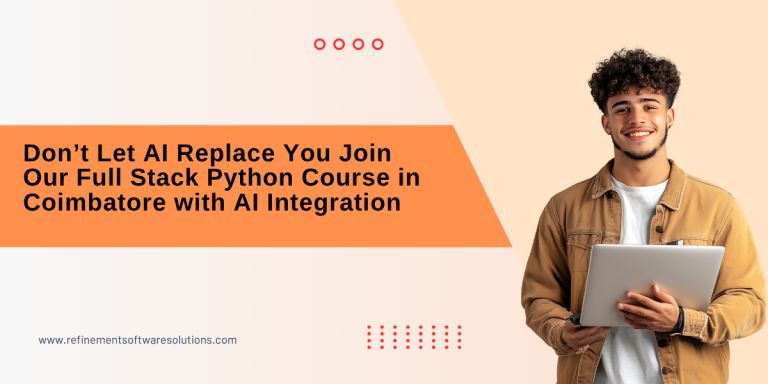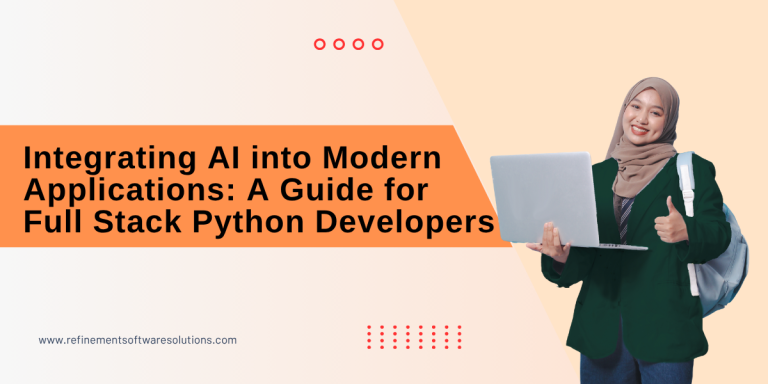Table of Contents
ToggleTechnology is the driving force behind most business operations. The demand for versatile and skilled developers continues to rise, and one of the most sought-after skill sets is Full Stack Development. Python, with its simplicity and powerful capabilities, has become a popular programming language for aspiring developers. In Coimbatore, a city rapidly emerging as a hub for IT professionals and tech enthusiasts, Python Full Stack Development courses are becoming increasingly popular. If you’re an aspiring developer looking to enhance your skills and step into the world of full-stack development, this course could be the perfect opportunity for you.
What is Full Stack Development?
Full Stack Development refers to the practice of developing both the front end (client-side) and back end (server-side) of web applications. A Full Stack Developer is responsible for handling everything from the design of the user interface to the logic and database management on the server side. Full Stack developers must be proficient in both front-end and back-end technologies, making them highly versatile and in-demand professionals in the tech world.
Python is one of the most popular programming languages used in full-stack development. It is known for its ease of use, clear syntax, and extensive library support. Python can be used for both back-end development (through frameworks like Django and Flask) and front-end development (using libraries like Pyjs). This makes Python a perfect choice for aspiring full-stack developers who want to build robust, scalable, and maintainable applications.
Why Choose Python for Full Stack Development?
Python’s versatility makes it an ideal choice for full-stack development. Here’s why:
- Ease of Learning: Python’s simple and readable syntax makes it an excellent programming language for beginners. Whether you are just starting your programming journey or are already familiar with other languages, Python’s learning curve is relatively low.
- Wide Adoption: Python is used by tech giants like Google, Instagram, and Spotify. Its popularity in the development community ensures ample learning resources, community support, and job opportunities.
- Powerful Libraries and Frameworks: Python offers a variety of frameworks and libraries to streamline development. Django and Flask are two popular back-end frameworks that facilitate rapid development of web applications, while libraries like ReactJS, VueJS, and Angular can be used for front-end development.
- Cross-Platform Compatibility: Python applications can run on various platforms without the need for additional configuration. This cross-platform nature allows developers to create applications that work seamlessly on multiple operating systems.
- Rich Data Handling Capabilities: Python has built-in libraries for data processing and handling, such as Pandas, NumPy, and Matplotlib, which are perfect for handling and visualizing data for web applications.
- Integration with Other Technologies: Python’s compatibility with other technologies, like JavaScript, SQL, and NoSQL databases, enables seamless integration across different layers of a web application.
Key Technologies Covered in the Python Full Stack Development Course
A comprehensive Python Full Stack Development course typically covers the following areas:
Front-End Development
- HTML/CSS/JavaScript: These are the fundamental technologies used to build the structure, style, and interactivity of a website. HTML (HyperText Markup Language) is used for the page structure, CSS (Cascading Style Sheets) for styling, and JavaScript for interactive elements on the website.
- Frontend Frameworks/Libraries (ReactJS, Angular, VueJS): These modern JavaScript libraries and frameworks are used to create dynamic, responsive, and user-friendly front-end applications. ReactJS, in particular, is one of the most widely used libraries in web development today.
- Responsive Design: Understanding how to build websites that function optimally on various devices, from desktops to mobile phones, is crucial. A Full Stack Developer needs to know the principles of responsive web design using frameworks like Bootstrap or Material-UI.
Back-End Development
- Python: As the primary programming language for this course, students will focus on using Python for server-side logic. Python is used to manage server operations and interact with databases, ensuring the application’s core functionality works efficiently.
- Django & Flask: These are two of the most popular Python-based web frameworks for building back-end applications. Django is known for its robustness and ease of use, while Flask is lightweight and gives developers more flexibility in their projects. Both frameworks come with built-in tools for routing, authentication, and database management.
- RESTful APIs: Understanding how to build APIs (Application Programming Interfaces) is essential for modern web development. APIs allow the front end and back end of a website to communicate with each other, enabling dynamic content to be rendered.
- Databases: Full Stack Developers must be proficient in database management. Learning both SQL (Structured Query Language) and NoSQL databases like MongoDB is critical. SQL is used for relational databases such as MySQL, PostgreSQL, and SQLite, while NoSQL databases are used for more complex, unstructured data storage solutions.
- Authentication & Authorization: Building secure applications is crucial for protecting user data. Learning how to implement secure login systems using JWT (JSON Web Tokens), OAuth, and other authentication mechanisms is a key part of back-end development.
Deployment and Hosting
- Web Servers (Nginx, Apache): Understanding how to configure web servers is essential for deploying applications to production environments. Students will learn about web server configuration, security, and performance tuning.
- Cloud Platforms (AWS, Heroku, DigitalOcean): Cloud platforms are widely used for deploying and hosting web applications. Developers will be taught how to deploy their applications to cloud platforms and ensure they run smoothly in a live environment.
- Version Control (Git, GitHub): Git is a version control system that allows developers to track changes in their code. Learning Git is essential for collaboration and managing codebases effectively.
- CI/CD (Continuous Integration/Continuous Deployment): Understanding CI/CD pipelines is important for automating testing and deployment. Developers will learn how to set up CI/CD workflows to improve efficiency and streamline development processes.
Why Coimbatore is the Ideal Place to Learn Full Stack Development
Coimbatore, often called the “Manchester of South India,” has emerged as a prominent IT hub in Tamil Nadu. The city is home to many well-established IT companies and has seen a steady increase in the demand for skilled developers. Here’s why Coimbatore is an excellent choice for learning Full Stack Development:
- Growing IT Ecosystem: Coimbatore’s thriving IT ecosystem offers ample job opportunities for Full Stack Developers. Companies like TCS, Cognizant, and Accenture have established offices in Coimbatore, providing a solid foundation for employment opportunities after completing the course.
- Affordable Education: Compared to major cities like Chennai and Bangalore, the cost of living and education in Coimbatore is relatively lower. This makes it an affordable city for aspiring developers to enroll in courses and gain hands-on experience.
- Proximity to Tech Startups: Coimbatore is home to many tech startups that offer opportunities for new developers. The exposure to real-world projects and startup culture can provide valuable experience for budding full-stack developers.
- Experienced Trainers: Coimbatore boasts a pool of experienced trainers who have worked with top tech companies. The instructors in Full Stack Development courses bring industry experience, ensuring students receive high-quality training and mentorship.
- Networking Opportunities: The city’s growing tech community offers opportunities for networking, attending workshops, hackathons, and seminars. Connecting with industry professionals can help students expand their career prospects.
Career Opportunities After Completing a Python Full Stack Development Course
After completing a Python Full Stack Development course, students can explore several career opportunities in the IT industry. Some of the most popular job roles include:
- Full Stack Developer: As a Full Stack Developer, you will be responsible for both the front-end and back-end development of web applications. You will need to handle everything from designing the user interface to managing databases and server-side logic.
- Back-End Developer: If you prefer to focus on the server-side development, you can work as a Back-End Developer. Your role will involve building APIs, managing databases, and ensuring the application’s core functionality is working seamlessly.
- Front-End Developer: If you have a strong interest in designing user interfaces and ensuring a smooth user experience, you can work as a Front-End Developer. Your job will involve writing code for the website’s layout, design, and functionality using HTML, CSS, and JavaScript.
- Web Application Architect: As a Web Application Architect, you will design and implement the overall architecture of web applications. You will work with both front-end and back-end technologies to create scalable and maintainable systems.
- DevOps Engineer: A DevOps Engineer focuses on automating the development and deployment processes. They work on integrating code, testing it, and deploying it to production environments using CI/CD pipelines.
- Cloud Engineer: Cloud Engineers are responsible for deploying and managing applications on cloud platforms like AWS, Azure, or Google Cloud. They ensure the infrastructure is secure, scalable, and cost-effective.
Enroll Python Fullstack Development Training in Refinement Software Solutions
Refinement Software Solutions is a leading IT services provider specializing in innovative software solutions. They focus on delivering custom software development, web application development, mobile app development, and IT consulting services. With a team of skilled professionals, Refinement Software Solutions helps businesses streamline their operations and enhance their online presence through tailored software solutions. Whether you’re a startup or a large enterprise, Refinement Software Solutions offers services that cater to your unique business needs, ensuring long-term growth and success.
Conclusion
Python Full Stack Development is a highly rewarding career path for aspiring developers. With its robust libraries, frameworks, and vast community support, Python provides all the tools needed to build modern, scalable, and efficient web applications. If you are looking to gain expertise in both front-end and back-end development, a Full Stack Development course in Coimbatore is an excellent opportunity to kickstart your career.




